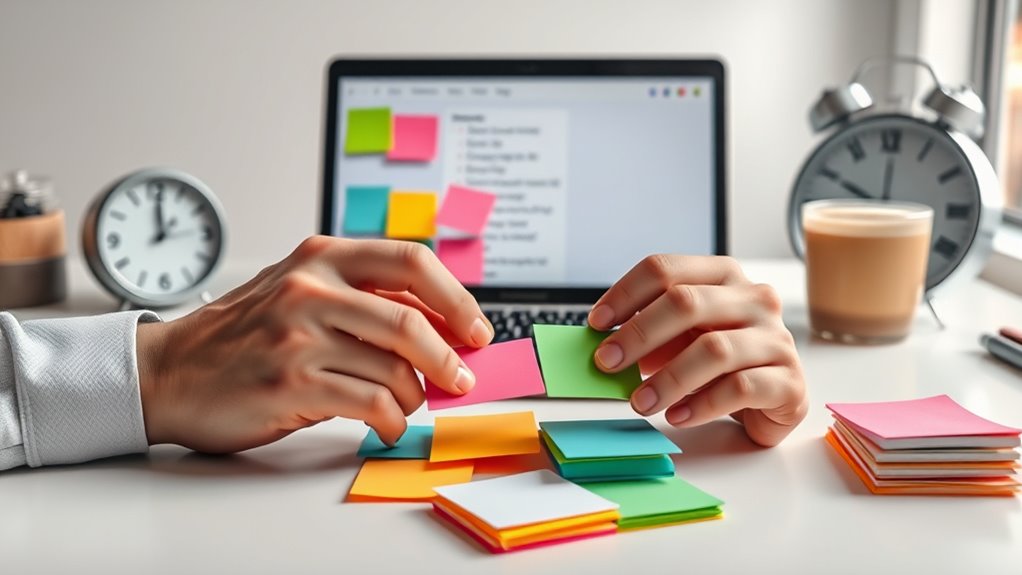To beat procrastination using micro-tasks, start by breaking big projects into tiny, specific steps. Focus on completing one small task at a time instead of the entire goal, which makes getting started less overwhelming. Consistently tackle these micro-tasks daily to build momentum and habits that stick. Over time, this approach transforms your mindset and makes even large tasks feel manageable. Keep going, and you’ll discover how simple steps can lead to lasting progress.
Key Takeaways
- Break large tasks into small, specific micro-tasks to make starting easier and less overwhelming.
- Focus on completing one micro-task at a time to build momentum and reduce anxiety.
- Establish a routine by consistently dedicating brief periods to micro-tasks, forming helpful habits.
- Prioritize micro-tasks to clarify goals, improve focus, and prevent distraction.
- Celebrate small wins to boost motivation and reinforce the habit of overcoming procrastination.
Breaking Tasks Into Small, Manageable Steps

Procrastination can feel overwhelming, making even small tasks seem impossible to tackle. When you’re stuck in this cycle, it’s easy to believe that the only solution is to suddenly find the motivation to complete everything at once. But that’s rarely effective. Instead, you need a smarter approach—one that involves breaking tasks into tiny, manageable steps. This is where micro-tasks come in. By focusing on small, specific actions, you can regain control over your workload and reduce the anxiety that fuels procrastination. To do this successfully, you’ll want to hone your time management skills and develop habits that support consistent progress. When you plan your day around micro-tasks, you make it easier to start and maintain momentum. You’re not committing to finishing a whole project in one sitting; you’re simply aiming to complete a small part, which feels less intimidating. Over time, these small wins add up, creating a sense of achievement and reducing the mental barriers that keep you from starting.
The key to making this work is habit formation. When you consistently set aside a few minutes to tackle a micro-task, it becomes a natural part of your routine. Whether it’s five minutes to organize your desk or ten minutes to draft an email, these tiny actions gradually become habits. The more you embed micro-tasks into your daily schedule, the less likely you are to fall into the trap of procrastination. It’s about creating a rhythm—small, regular efforts that build momentum and make larger tasks seem less intimidating. As these habits solidify, you’ll notice that starting tasks feels easier, and the urge to delay diminishes. You won’t have to rely on willpower alone; instead, your routine will carry you forward. Additionally, understanding how market volatility impacts investments can help you make more informed decisions and stay committed to your financial goals.
Using micro-tasks also sharpens your time management skills because it encourages you to prioritize and focus on what’s essential. When every small step is planned, you gain clarity about your goals and how to achieve them efficiently. You’re less likely to get sidetracked or overwhelmed because you’ve broken down your workload into bite-sized pieces. This clarity helps you stay accountable and motivated, especially when you see the progress you’re making. Ultimately, mastering micro-tasks and habit formation transforms your approach to work and tasks—making procrastination less tempting and more manageable. It’s a simple yet powerful strategy that, when practiced consistently, can change the way you handle your responsibilities forever.
Frequently Asked Questions
How Do I Decide the Right Size for Each Micro-Task?
When deciding the right size for each micro-task, focus on task prioritization and ideal sizing. Break down larger tasks into smaller, manageable parts that can be completed in a few minutes. Consider your energy levels and focus ability—if a task feels overwhelming, make it even smaller. Test different sizes, and adjust based on how quickly you finish and how motivated you feel. This helps keep you productive and avoids burnout.
Can Micro-Tasks Be Effective for Large, Complex Projects?
Micro-tasks can be highly effective for large, complex projects because they help you break down complexity into manageable steps. By managing scope in smaller chunks, you prevent feeling overwhelmed and maintain momentum. Focus on dividing tasks into clear, actionable pieces, and work through them systematically. This approach makes tackling big projects more approachable, keeps you motivated, and ensures steady progress without getting lost in the details.
How Do I Stay Motivated to Complete Small Tasks Consistently?
Imagine you start each day with a quick 5-minute task, like organizing your desk. This builds habit formation, making it easier to stay motivated. To keep consistent, set up reward systems, like a coffee break after completing your micro-tasks. These small wins boost your motivation and reinforce positive behavior, turning task completion into a habit. Over time, this approach helps you stay engaged and productive daily.
What Tools Can Help Me Track My Micro-Tasks Efficiently?
To track your micro-tasks efficiently, digital planners and habit trackers are great tools. Digital planners help you organize and schedule tasks, making it easy to see what’s next. Habit trackers monitor your progress and keep you accountable. By consistently updating these tools, you stay focused and motivated. They give you a clear visual of your achievements, helping you build momentum and beat procrastination easily.
How Do I Handle Setbacks or Lost Momentum in Micro-Tasking?
Did you know that 70% of people lose motivation after setbacks? When you face setbacks or lose momentum in micro-tasking, try recovery strategies like breaking tasks into even smaller steps or revisiting your goals. Use motivation boosters such as rewarding yourself or reflecting on progress. Stay flexible, remind yourself why you started, and re-engage with fresh energy. These approaches will help you bounce back quickly and maintain momentum.
Conclusion
By breaking your tasks into tiny, manageable steps, you substantially reduce overwhelm and boost your motivation. Did you know that completing small tasks can increase your productivity by up to 30%? So, next time procrastination hits, just focus on one micro-task at a time. You’ll find it easier to start, stay consistent, and ultimately finish your goals faster. Remember, big progress begins with small, simple actions—so take that first step today!









